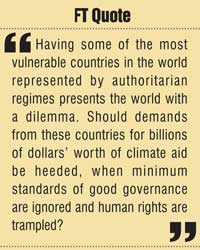Monday Feb 23, 2026
Monday Feb 23, 2026
Saturday, 6 June 2015 00:00 - - {{hitsCtrl.values.hits}}
Maldives President Abdulla Yameen Abdul Gayoom
The Guardian: This week sees governments meeting in Bonn, Germany for the last negotiating session in advance of November’s UN meeting on climate change in Paris – billed as the best chance in a generation for a worldwide treaty to tackle global warming.
The omens are better than for many years. The political landscape was changed dramatically by last November’s China-US emissions deal. With the world’s two biggest emitters covered, other pledges have been arriving thick and fast: the task for Paris will be to forge them into a global agreement with legal force.
The other major issue under discussion in Bonn is finance, in particular how the commitment to providing developing countries $ 100 b a year by 2020 for climate adaptation and mitigation can be funded. One of the strongest and most morally charged voices in this arena is the Alliance of Small Island States (Aosis), who are most vulnerable to sea level rise and other climate impacts. But this is where the problems start.
The chair of Aosis is currently the Maldives, a country of hundreds of coral atolls, none of them more than a metre above sea level. The Maldives shot to global attention in 2009, when its charismatic President Mohamed Nasheed held an underwater cabinet meeting to raise awareness of his nation’s plight, and later pledged to make his country the world’s first carbon neutral state.
Nasheed personally took on the might of China and the US in the climactic closed-door heads of state meeting in Copenhagen in 2009. He then defended the deal from the conference floor when other world leaders had already jetted home, salvaging some positives from a process that was otherwise headed towards total collapse.

However, the Maldives is no longer represented by Nasheed, who was ousted in a coup in 2012 and later lost a rigged presidential election to the half-brother of the former dictator. Nasheed was recently arrested, tried and sentenced to 13 years in prison following a politically-motivated trial Amnesty International decried as a “travesty of justice”. He is currently languishing in an unsanitary jail with highly-restricted access to medical care, legal representation or visits from his wife and young children.
The Maldives’ new autocratic leadership has gutted the country’s democratic institutions and imprisoned every political opposition leader. The authoritarian President Abdullah Yameen has ditched the carbon neutral pledge and plans instead to drill for oil in the Maldives’ pristine coral-fringed waters. Yet this is the voice, as chair of Aosis, now supposedly representing the moral force of small island states at the international climate negotiations.
Having some of the most vulnerable countries in the world represented by authoritarian regimes presents the world with a dilemma. Should demands from these countries for billions of dollars’ worth of climate aid be heeded, when minimum standards of good governance are ignored and human rights are trampled?
In the Maldives, Yameen’s Ministers have been accused of links with international gangsters and drug-dealers. Corruption is endemic, while journalists have been threatened, beaten and disappeared. Islamic extremism, meanwhile, is thriving, with hundreds of Maldivians reportedly travelling to Syria to join Islamic State.
The problem was recognised by Nasheed when in office. Sharing his concerns over the possible channeling of western climate aid through corrupt governments in developing countries, he said: “The money is rarely spent on what it should be. Even that which isn’t stolen is spent on the wrong thing. The contract is given to a minister’s relative, rather than to a reputable company.”
This is not a call to reduce the amount of aid pledged in Paris: the $ 100 b target has been agreed and should be met. But there is surely now a strong case for setting up procedures to enforce minimum standards of accountability for countries aiming to draw from these funds. There are plenty of Aosis members and other vulnerable nations that respect democracy, human rights and good governance, from Barbados to Cape Verde to Samoa.
These countries should be first in the queue, while nations like the Maldives that slip backwards into autocracy and corruption should be excluded from accessing climate finance support. In the meantime, Aosis should come to its senses and realise that it is damaging the interests of small island states worldwide to have its collective voice represented by a regime that crushes democracy and imprisons opposition leaders.
Human rights and climate change cannot be traded off against each other. It is because human rights and dignity are accepted as universal values that there is a moral case for climate finance in the first place – to address the injustice of those suffering the worst climate impacts not being those who bear the most responsibility for global warming.
Morality is a double-edged sword – if you behave unjustly yourself, you forfeit any claim to moral leadership. That is why the Maldives cannot represent climate leadership while an aspiring dictator remains at the helm.
Nasheed signs a declaration during the first underwater cabinet meeting in the Maldives on 17 October 2009 – Reuters